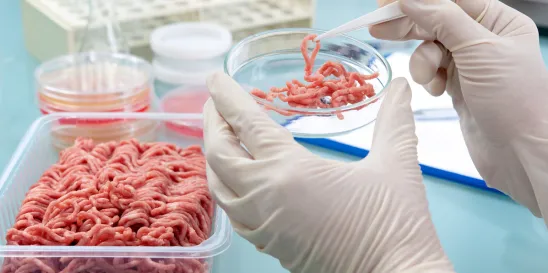In June of this year, the USDA approved the label of “cell-cultivated chicken” to be used for the sale of laboratory grown chicken. It also issued grants of inspection to Upside Foods and Eat Just (GOOD Meat), authorizing both companies to start selling their cell-cultivated chicken to the public.
As of yet, no cell-cultivated meats have been approved for sale in the EU. However, the European Food Safety Authority (“EFSA”) has already been preparing for the eventuality of cell-cultivated meats. In a recent interview, an EFSA official stated that cell-cultivated meat would be considered a “novel food” and a safety assessment by EFSA would have to be done and authorization given by the Member states and the European Commission. According to EU regulations, a “novel food” is one “that had not been consumed to a significant degree by humans in the EU before 15 May 1997.” Novel foods require authorization before they can be sold and they must be found to be (1) “safe for consumers,” (2) “[p]roperly labeled, so as not to mislead consumers,” and (3) “[i]f novel food is intended to replace another food, it must not differ in a way that the consumption of the Novel Food would be nutritionally disadvantageous for the consumer.”
Recently, Cultivated B, a German company, began the pre-submission process with the EFSA for a sausage product, similar to a hot dog, consisting of vegetable ingredients and cell-cultivated meat. During the pre-submission period, Cultivated B will be able seek guidance from the EFSA about the rules that will apply to its application and what needs to be included in the application. The EFSA recommends that companies seeking pre-submission guidance submit requests at least six months before the company plans to submit an application. After an application is submitted, the approval process can last a number of months. As recognized by Cultivated B, “EFSA’s Novel Food regulatory approvals process is among the most robust in the world, including a thorough and evidence-based assessment of food safety and nutritional value.” Cultivated B hopes that EU approval, once obtained, will lay the groundwork for approval of its products in other countries.
This past summer, Israeli company, Aleph Farms, applied with the Swiss Federal Food Safety and Veterinary Office (FSVO) for approval of its Black Angus-style thin cultivated cuts. (Switzerland is not in the EU, so it has its own food safety approval process). This was the first application submitted in Europe for the sale of cell-cultivated meat. Aleph Foods is also seeking regulatory approval for these products in Singapore and Israel. Helpfully for Aleph Foods, in January of this year, Ashkenazi Chief Rabbi David Lau issued an opinion that Aleph Food’s cell-cultivated beef (although not necessarily all cell-cultivated meat) is kosher. (Different companies use different processing methods and cultural mediums, so each company desiring kosher certification would need to seek approval based upon its own specific process.) Last month, the Orthodox Union Kosher gave kosher certification to SuperMeat, a Tel Aviv-based company.
In order to open markets to the world’s large Muslim population, cell-cultivated meat companies are also exploring halal certification. Aleph Farms is working with Esco Aster to create the world’s first halal certified factory in Singapore. GOOD Meat, which already has approval in the US to sell cell-cultivated chicken, commissioned a group of Shariah scholars to determine if cell-cultivated meat can be halal. Last month, the group determined that it is possible. Several criteria were established to determine if a product could be halal certified:
- The cells were taken from an animal that is permissible to eat;
- The animal supplying the cells was slaughtered pursuant to Islamic law;
- The nutrient blend used to cultivate the cells can’t contain ingredients impermissible for Muslims;
- The cell-cultivated meat is edible and not harmful.
However, not all responses to cell cultivated meat have been positive. Italy has already voted to ban the production, import and/or distribution of cell-cultured products from vertebrate animals for human consumption. Regarding this ban, Minister Francesco Lollobrigidain stated,
We look at the protection of our community. As a Government, we have addressed the issue of quality that laboratory products do not guarantee. We wanted to protect our culture and our tradition, including food and wine. If the production of synthetic foods were to be imposed on the markets, there would be greater unemployment, more risks for biodiversity and products which, in our opinion, would not guarantee well-being. There is not a persecutory attitude but a strong desire for protection.
Former Agriculture Minister of France, Julien Denormandie, has also expressed a stance against cultivated meat. When Singapore became the first country to approve cell-cultivated chicken, Minister Denormandie tweeted, “Is this really the society we want for our children? Me no. I say it clearly: meat comes from living things, not from laboratories. Count on me to ensure that in France, meat remains natural and never artificial!” (translation provided by Google).
Without a doubt, the cell-cultivated meat companies are racing ahead with their products. Approval of these products by many countries around the world seems inevitable. Undoubtedly, there will be hold outs, but you should expect to see these products in your local markets.



 />i
/>i

